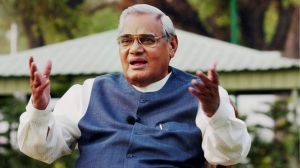RJD’s ‘surprise’ Buxar victor, Sudhakar Singh: A perennial ‘rebel’ devoted to farmers’ cause
‘Why should govt spend on bullet trains instead of farm sector,’ asks first-time MP Sudhakar, who was forced to resign as agriculture minister in Nitish cabinet after he had called his own dept “corrupt”
 Sudhakar has thus become the MP for the first time after defeating the BJP’s Mithlesh Tiwari in a close contest by about 30,000 votes. (X/@SudhakarSingh)
Sudhakar has thus become the MP for the first time after defeating the BJP’s Mithlesh Tiwari in a close contest by about 30,000 votes. (X/@SudhakarSingh)Among the four seats the Rashtriya Janata Dal (RJD) won in Bihar in the recent Lok Sabha polls, the party’s most surprising victory came from the Buxar seat.
The constituency, locally known as “mini-Kashi”, has been bagged by the BJP six times in the last seven elections. However, this time, the seat was wrested from the BJP by the RJD’s Sudhakar Singh, 48, a former MLA. Sudhakar has thus become the MP for the first time after defeating the BJP’s Mithlesh Tiwari in a close contest by about 30,000 votes.
Though Sudhakar comes from a politically influential family—his father Jagadanand Singh is the state RJD president and the only non-BJP leader who had won Buxar before him (in 2009)—his political journey has not been without struggles.
In the 2010 state Assembly polls, when he tried to kickstart his electoral innings from the Ramgarh seat in the Buxar region, his father denied him an RJD ticket. Disappointed, Sudhakar sought a ticket from the BJP, which obliged. A miffed Jagadanand campaigned against his own son for 45 days and ensured his defeat.
“My father perhaps thought I was not capable of contesting an election. Perhaps, he thought I was too young,” Sudhakar says about his father’s opposition to his first electoral bid.
“It taught me that in politics, father-son relationship has no meaning. It is fine in the personal space. It taught me that on the question of ideology and policy, it is essential to remain steadfast. In politics, ideology and policies are prime and my father decided to stick to it, without a care for his relationship with me. I believe what he did was right. He stood by his party and ideas,” Sudhakar says, stressing that the episode did not leave any bitterness between the father-son duo.
But it is not just his father that Sudhakar has rebelled against. As the agriculture minister in the Nitish Kumar-led Mahagathbandhan government, he called his own department “corrupt” and accused the CM of not being concerned about farmers’ issues. He was forced to resign.
“Imagine the kind of political atmosphere we are living in, where a minister can’t express a difference of opinion with his government. Isn’t this part of democracy’s fundamentals? As far as ideas are concerned, I have stood against my father and against Nitish Kumar. Now I’ll stand against Narendra Modi,” he says.
However, politics was not always Sudhakar’s first choice. Having studied in a government school in Ramgarh, Sudhakar graduated from Kirorimal College in Delhi and nursed dreams of becoming a businessman. He worked with Tata Iron and Steel Company (TISCO) and Kalyanpur Cement before starting his own agri business. But politics was always there in him.
“In 1994, I contested the Kirorimal College elections as an Independent but lost with a small margin. At that time, WTO negotiations on the Dunkel draft were going on and we protested against it, as it would hurt farmers’ interests,” he says.
While pursuing his business, Sudhakar also got associated with the RJD and held many agitations demanding the minimum support price (MSP) for farmers’ crops in Bihar. “Following our agitation, the Centre made a commitment that in Bihar too we will open FCI purchase centres to buy farmers’ crops at MSP,” he says.
After his stint with the BJP between 2010 and 2015, Sudhakar returned to the RJD and won the Ramgarh Assembly seat on its ticket in the 2020 polls.
On being asked why in 2010 he joined the BJP, a party he now opposes, Sudhakar says, “When I was contesting elections as a BJP candidate, the political situation was different. Then the BJP was in the Opposition (at the Centre) and its economic policies were different. They were against FDI in retail. Their farm sector policies were different. At that time they wanted a law on land acquisition. But after coming to power, parties change their character. It has now become a tough choice between party and policy for an honest politician.”
The first-time MP argues that the Modi government’s three contentious farm laws angered him enough to run for Parliament. “I felt I will have to raise issues of the people there. We feel there should be more representatives from the farm sector in Delhi,” he says.
On how he won the “tough” Buxar seat, Sudhakar says, “I think winning elections are easy. If you ask me to contest against the PM, I will feel no nervousness or difficulty. I am always ready for a fight. I have even challenged Nitish Kumar in his own constituency. I find elections to be easy because I fight on issues and not on caste equations.”
According to Sudhakar, his resignation from Nitish’s Cabinet over farmers’ issues endeared him to the people of Buxar. “People felt that for their sake, I had sacrificed my ministership. People felt this man fights for us. So when the polls came, people fought for me,” he says.
On how he felt attending Parliament for the first time, Sudhakar says, “I was shocked to find there is no difference between the Bihar Assembly and the Lok Sabha. I felt sad. On such an important issue of the NEET paper leak, the Speaker was not allowing the LoP to speak. When there was a protest over this, the Speaker said I will allow it after the debate on the President’s address. But the House was adjourned with a full day left for the session to end.”
During the upcoming Budget Session Sudhakar would highlight the issue of falling income of farmers. “It is a man-made problem. The government is spending a tiny portion of public finance on the farm sector. To ensure the interest of 60% of the people of this country, there should be a big allocation for the farm sector. The government is spending money on bullet trains, which will be used by few people. Why should government be spending on bullet trains? If it is needed, let private players invest in it and earn out of it,” he says.
- 01
- 02
- 03
- 04
- 05































